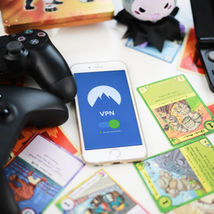Simple and Effective Ways To Protect Yourself Online
Updated: May 12, 2021
It’s never been more important to be tech-savvy about protecting ourselves online. The truth is that the moment new online security becomes available (think software updates, etc.), hackers are already trying to breach it. It’s a never-ending cycle of cat and mouse. However, you don’t need a degree in IT to protect your details - far from it. You can take some simple steps to protect your personal information and save yourself from suffering a data breach. This article looks at some steps you can take today.

1. Use Antivirus Software
Antivirus software typically protects you against malware. Malware is the name given to software with the specific intent to cause damage to a computer, server, network, or client. This can be devastating, which is why it is worth paying for antivirus software that’ll protect you from malware like Ransomware and Trojan horse programs.
Regardless of the type of antivirus software selected, you’ll more than likely need to renew it every year. If you’re happy with the service you’re receiving, then having it run consecutively avoids any interruption in service.
2. Use a VPN
Virtual Private Networks (VPN) are becoming increasingly popular because they protect you against someone trying to access your information in a Wi-Fi spot that has lax security.
VPN’s do this by encrypting your internet traffic and routing it through a server owned by the VPN company. This stops anyone from gaining access to your files or data sent from your laptop to your mobile phone or vice versa. VPN’s also hide your IP address, showing theirs instead. This is a great way to stop trackers from determining your location. If you’re ever working in a coffee shop, library, or anywhere that has free Wi-Fi, you should use a VPN for your protection.
If you’re interested in using a VPN, there are plenty of websites where you can even earn discounts, including swagbucks.com, or where you can obtain a trial period via coupons or discount codes. Some websites even provide different discounts to suit your needs, ranging from Spring deals and deals for a three-year commitment.
3. Have More Than One Email
This is not an uncommon thing. Many of us have different email accounts, perhaps one for work and another for everything else. However, think about having different emails for different purposes—for example, a personal email for communicating with friends or family and another for subscribing to websites.
If you decide to do this, you need to keep your online identities associated with each email address separate from each other. So if you are on a social media platform, you wouldn’t have the email address that you use for subscribing to websites listed as a way of contacting you. Nor would you have your personal email as your preferred email for your subscriptions.
4. Have Unique Passwords
Imagine you have the same password for all the places you shop at, and a hacker has purchased a batch of emails and passwords, one of which is yours. They could use it to gain access to your accounts, purchase stuff and have access to even more of your personal information.
This is why having long passwords that are alphanumeric, include symbols, and use capital, and lowercase letters will always make it more difficult for someone to gain access to your accounts. But this can be extremely time-consuming, so consider using a password manager.
If you use a password manager, then you only need to create a strong password to unlock it. By unlocking it, you’re automatically unlocking passwords to all your online accounts. This has several advantages, including never having to remember multiple passwords and also saving time.
5. Use Two-Factor Authentication
Two-factor identification requires you to submit two different types of information to prove who you are. The first is usually your email and password. The second could be your fingerprint or a code sent to your phone by text. Two-factor authentication makes it impossible for a hacker who has only your password and email to access your information.
If you use online banking, then you will have experienced two-factor authentication. Yes, it’s an extra step to gain access to your financial information, but it provides better security for sensitive information.
6. Protect Your Social Media
Have you ever heard the phrases “Nothing in life is for free” or “You never get something for nothing”? Well, think about social media. Most platforms are free, but are they really? They encourage you to share your life, thoughts, and significant moments, all the while collecting this information about you.
Try accessing your Facebook data to see what information this social media platform has gathered about you. You’d be surprised at the information you’ve freely given it. You can take steps to prevent Facebook from sharing your information with a bit of research. It’s definitely worth doing as your privacy is priceless.
7. Keep Your Cache Clear
Any device you use to access the internet keeps building a cache of information on you. Over time this can include personal details, like your home address, information about your family and friends, cookies, saved searches, and your web history.
You can prevent this information building up by regularly clearing your internet browser’s history and cookies. Getting into a regular routine of clearing it and your browser’s information about you is a good habit to get into.

Despite the internet being around for years, most of us are still novices when it comes to protecting ourselves from an online attack or having our privacy invaded. We wouldn’t stand for it in reality, so what makes the internet different? More people need to take online security seriously because if personal details are accessed, it can take a while to sort it out, causing unnecessary stress. This could all be avoided by using some, if not all, of our suggestions to protect yourself online.




















